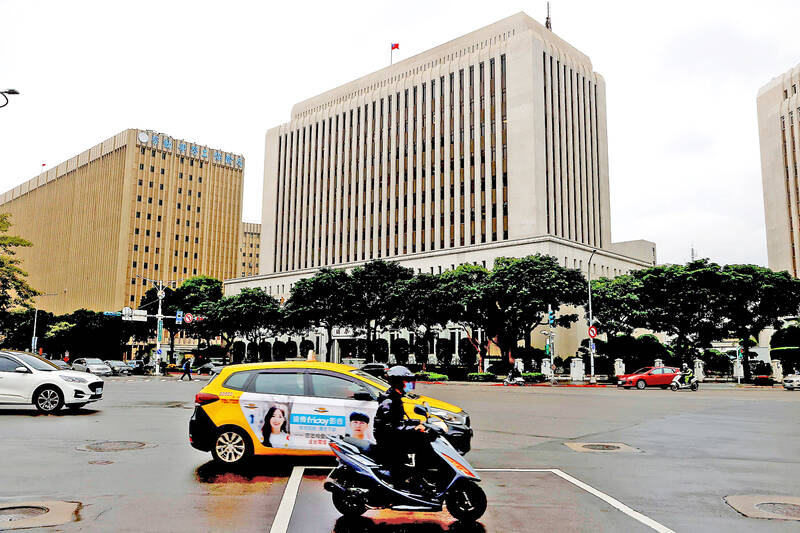Taiwan’s accounts last quarter registered a US$29.11 billion surplus on the back of improving exports, but capital outflows grew by US$29.19 billion, leaving the balance of payments (BOP) at a deficit of US$330 million, the central bank said yesterday.
It is the first BOP deficit since the third quarter of 2022, the central bank said, adding that its effort to slow the local currency’s depreciation against the US dollar contributed to the deficit.
The central bank said there is no need to worry about the difference between the capital outflows and current account surplus because it is quite small.

Photo: Ann Wang, Reuters
The rapid capital outflows also had to do with active purchases of US government and corporate bonds by local banks, life insurers and individuals on expectation that the US Federal Reserve (Fed) would cut interest rates later this year.
Interest rate cuts would boost bond prices.
The Fed has said it would cut rates when it is confident enough that inflation is headed toward its 2 percent target.
The US consumer price index last month grew 3.4 percent from a year earlier, but the Fed said it would not be considering interest rate hikes.
It is common for countries with current account surpluses to see capital outflows, because financial institutions need to digest idle funds and pursue returns, the central bank said.
Capital outflows also happen in Japan, Germany, Singapore and South Korea, the central bank added.
The high interest rates in the US make its government and corporate bonds safe and attractive investment targets, and the US dollar has benefited from global fund deployment, the central bank said.
At the same time, the deficit in the services account widened from US$2.17 billion to US$2.54 billion, as outbound travel increased and inbound tourist arrivals continued to leave much to be desired, the central bank added.
The number of Japanese tourists, for instance, have not returned to pre-COVID-19 pandemic levels, given the weakening of the yen, which makes overseas travel expensive for the Japanese, local hotels have said.

Semiconductor shares in China surged yesterday after Reuters reported the US had ordered chipmaking giant Taiwan Semiconductor Manufacturing Co (TSMC, 台積電) to halt shipments of advanced chips to Chinese customers, which investors believe could accelerate Beijing’s self-reliance efforts. TSMC yesterday started to suspend shipments of certain sophisticated chips to some Chinese clients after receiving a letter from the US Department of Commerce imposing export restrictions on those products, Reuters reported on Sunday, citing an unnamed source. The US imposed export restrictions on TSMC’s 7-nanometer or more advanced designs, Reuters reported. Investors figured that would encourage authorities to support China’s industry and bought shares

FLEXIBLE: Taiwan can develop its own ground station equipment, and has highly competitive manufacturers and suppliers with diversified production, the MOEA said The Ministry of Economic Affairs (MOEA) yesterday disputed reports that suppliers to US-based Space Exploration Technologies Corp (SpaceX) had been asked to move production out of Taiwan. Reuters had reported on Tuesday last week that Elon Musk-owned SpaceX had asked their manufacturers to produce outside of Taiwan given geopolitical risks and that at least one Taiwanese supplier had been pushed to relocate production to Vietnam. SpaceX’s requests place a renewed focus on the contentious relationship Musk has had with Taiwan, especially after he said last year that Taiwan is an “integral part” of China, sparking sharp criticism from Taiwanese authorities. The ministry said

US President Joe Biden’s administration is racing to complete CHIPS and Science Act agreements with companies such as Intel Corp and Samsung Electronics Co, aiming to shore up one of its signature initiatives before US president-elect Donald Trump enters the White House. The US Department of Commerce has allocated more than 90 percent of the US$39 billion in grants under the act, a landmark law enacted in 2022 designed to rebuild the domestic chip industry. However, the agency has only announced one binding agreement so far. The next two months would prove critical for more than 20 companies still in the process

CHANGING JAPAN: Nvidia-powered AI services over cellular networks ‘will result in an artificial intelligence grid that runs across Japan,’ Nvidia’s Jensen Huang said Softbank Group Corp would be the first to build a supercomputer with chips using Nvidia Corp’s new Blackwell design, a demonstration of the Japanese company’s ambitions to catch up on artificial intelligence (AI). The group’s telecom unit, Softbank Corp, plans to build Japan’s most powerful AI supercomputer to support local services, it said. That computer would be based on Nvidia’s DGX B200 product, which combines computer processors with so-called AI accelerator chips. A follow-up effort will feature Grace Blackwell, a more advanced version, the company said. The announcement indicates that Softbank Group, which until early 2019 owned 4.9 percent of Nvidia, has secured a